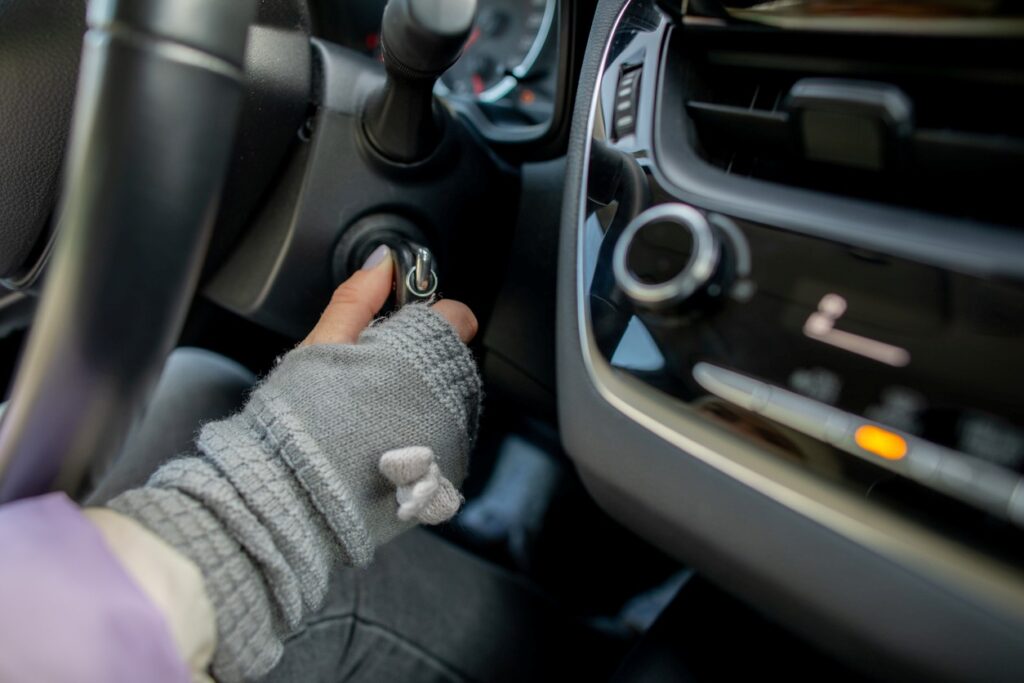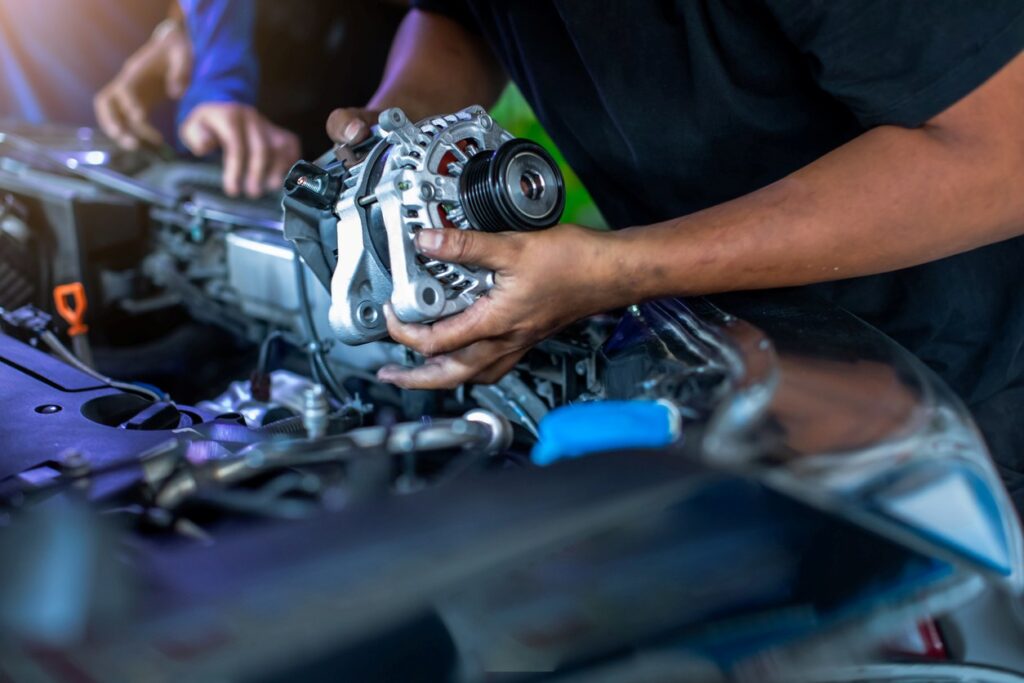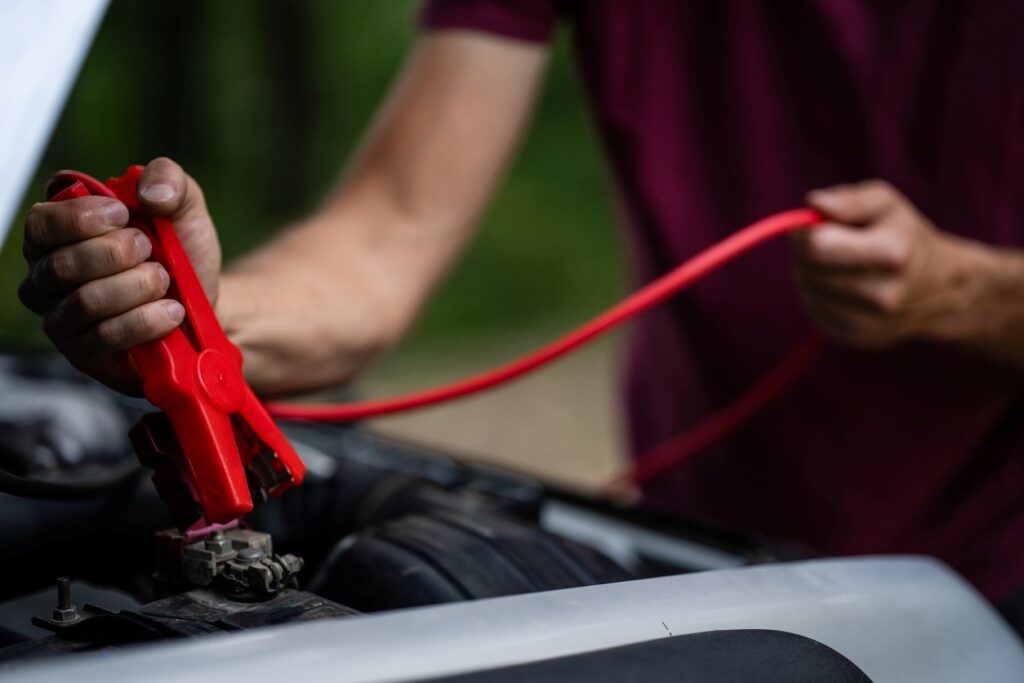Car battery problems are common, but they are not always easy to identify. When it’s below freezing and you’re stuck in a parking lot with a car that won’t start, knowing what’s wrong can save you a lot of time and frustration. Sometimes, it’s not as serious as it seems, and there may be a few quick steps you can take to get the engine running again and back on the road.
We’ll go over everything you need to know about diagnosing car and truck battery issues, how to get back on the road when it’s cold, and when it’s time to reach out for help from your local Kennedy Transmission team.
Auto Battery 101
Nearly all car batteries, regardless of size, work in the same way. Inside each battery are stacks of metal plates submerged in an electrolyte solution. Some plates carry a positive charge, others a negative one, and the acid between them allows electricity to flow.
Temperature affects how quickly electricity moves through the battery, which is why many car battery problem signs show up in cold weather. When the weather drops, your battery can’t generate as much energy at once, which is why cars often struggle to start on cold mornings. The same battery that fires up perfectly fine in summer may slow down when temperatures fall below freezing.
How Long Does a Car Battery Last?
The amount of electricity your battery can produce is measured in cold cranking amps (CCA). You may have a few options when shopping for an auto battery replacement, but having more CCA doesn’t necessarily mean your battery will last longer. Instead, a higher CCA rating provides your battery with a stronger initial burst of energy, which is enough to start your car even in cold conditions where a lower-rated battery might fail.
How To Warm Your Car Battery

Batteries work slower in the cold, but there are ways to help them warm up before starting. One of the simplest tricks is to turn on your headlights for a few minutes before you try to start the engine. This small draw helps move some current through the battery, warming it internally.
Be careful not to use too much power right away, and avoid running the heater, defroster, or radio until after the car has started.
This is especially important for older batteries. After a short wait, turn the key and try to start your engine. If it still doesn’t turn over, don’t panic. There are multiple ways to narrow down whether it’s the battery, starter, or another component causing the problem.
What Does a Dead Starter Sound Like?
Dead starters happen, but more often than not, the issue is still your battery. During the winter, it can be easy to get confused when your car won’t start, especially if it’s making strange sounds.
If you turn the key and hear a single click or a series of rapid clicking noises, that’s often a sign your battery doesn’t have enough power to engage the starter motor.
However, if you don’t hear any sound at all, or if the engine cranks slowly but never catches, it could point to a failing starter. You can also check other electrical systems for clues. If your lights, radio, or dashboard still turn on, that means some power is reaching them, suggesting the issue may lie with the starter itself. On the other hand, if everything is completely dead, your battery likely needs a charge or replacement.
Other Reasons Your Car Won’t Start
Dead or aging batteries are the most common reason a car won’t start, so we always recommend keeping a portable car battery charger or jumper cables handy, especially during the winter months. However, if the problem persists, it could be a sign of something more complex happening beneath the surface.
Identifying Alternator Issues

Your alternator is responsible for charging the battery while the engine runs. If it stops working, your battery may still hold a small amount of power, but not enough to restart your car later. Even if you get a jump, you won’t get far without an alternator providing a steady charge.
Faulty Fuel and Oil Pumps
Both your fuel pump and oil pump rely on engine power to circulate vital fluids throughout your car. If either one fails, your vehicle may start briefly, but it will likely not stay running for long. A damaged fuel pump can prevent fuel from reaching the engine. Because the fuel pump uses power from the starter before ignition, you might hear the engine crank but not start. If the pump isn’t working, your car may sputter, stall, or fail to start entirely.
A failing oil pump can cause even more serious damage. Your engine might start, but if oil isn’t moving through the system, it can overheat or seize within minutes. Without proper lubrication, friction builds up fast, especially in cold weather when oil thickens. This is why temperature and oil quality are so closely linked to your overall engine health.
The Right Oil Weight for the Weather
Drivers in colder climates often use different oil weights to help their cars start and run smoothly in winter. Lighter oils flow more easily at low temperatures, reducing the strain on your starter and helping your engine circulate the fluid more quickly.
If you’re unsure what oil type is right for your vehicle, it’s always a good idea to talk with an ASE-certified technician at Kennedy Transmission. We can recommend the right oil weight and perform seasonal maintenance to keep your engine protected throughout the year.
Stay Ready for the Road With Kennedy Transmission
No matter what happens on the road, Kennedy Transmission can keep your vehicle running. Our technicians are ready to assist you with a comprehensive range of automotive services, including vehicle battery maintenance, battery replacements, starter checks, alternator repairs, and oil changes.
We take pride in helping drivers stay confident and informed with clear communication and upfront service. Visit your nearest Kennedy Transmission location today to schedule an inspection or maintenance appointment.

